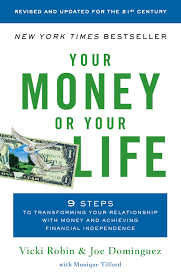
Welcome to week one of the Your Money or Your Life Online Book Club, where we will be tackling the nine steps of the YMOYL program over the next nine weeks.
Get more background info. and a complete list of the steps here.
First, I want to stress that this isn't
my book club, it's
our club. I'm making the format up as I go along, so if you have any suggestions, please speak up! Now that the housekeeping items are out of the way, let's start, shall we?
When I went back and really studied chapter one, The Money Trap: The Old Road Map for Money, in preparation for writing this post I realized just how much wisdom is packed into the first chapter of
Your Money or Your Life alone. We could easily spend a few weeks discussing just this chapter, but since nine weeks is already a lot of time to ask of you, I'm not going to do that.
What do you want to get out of this book and book club?
I so identify with Penny Y's comments at the beginning of chapter one, her feelings of wondering
is this really it? I played the game as instructed. I got good grades, went to college and got a good job. But just like Penny, since graduation I've been plagued by feelings of "is this really it?" You work and work until you retire? It's not that I hate everything about my job, I just want to work on my own terms. I don't want to be forced to make work the primary thing in my life and squeeze the rest of my life in the time that's left. To me, financial independence equals freedom and that's what I'm hoping to find through the YMOYL program.
What about you, what do you want to get out of this?
Wisdom from Chapter One
What are your favorite parts of chapter one? What did you find most enlightening? Some of mine include:
- We aren't making a living, we're making a dying: "What they do for money dominates their waking hours, and life is what can be fit into the scant remaining time."
- As we work more, our saving rates have actually decreased: "According to the U.S. Department of Commerce, the U.S. personal savings rate has hovered between 0 and 1 percent over the past three years. By comparison, a quarter century earlier in 1981, Americans saved and average of 10.9 percent.
- The daily grind isn't making us happy: "It is becoming increasingly clear that beyond a certain minimum of comfort, money is not buying us the happiness we seek."
- Once you have enough, more isn't better. "If you live for having it all, what you have is never enough."
- Materialism creates clutter. "What creates clutter? It comes from the disease of materialism, of looking for inner fulfillment in outer possessions."
Week 1 Activity - Step 1: Making Peace with the Past
The first step of the YMOYL program is to "examine the past so you can understand and take responsibility for the present." There are actually two parts of this step:
A. Calculate how much money you have earned in your lifetime.
B. Find out your net worth.
A. How much money have you earned in your life?
At first this task seems almost impossible, but you likely have records that will make this easier to do than it may seem at first. If you have your Social Security Administration Statement of Earnings, you can quickly find your income earnings in one spot. Other retirement plan annual statements may offer the same information. If not, you can always turn to your old income tax returns.
Once you have your reported income earnings, you need to add any unreported earnings you received as well as cash gifts, rent received, earnings from selling your clutter, etc. I found going through my old check registers helpful for getting some of this information. Obviously unless you are a record-keeping fiend your number is going to be somewhat of an estimate, but even so seeing that total can be a powerful surprise.
As the book says, the value of this step is that it shows you just how much money has entered your life in the past and how much could enter in the future. It can also help eradicate false beliefs about your earning potential or your financial past.
B. What have you got to show for it?
Now that you know how much money you've earned, you will calculate your networth to see how much you have to show for it. To calculate your networth, you need to add up all your assets (savings, retirement accounts, cash, house, car, personal belongings, etc.) and subtract your liabilities (any money you owe including unpaid bills, loans, mortgage balance, etc.). See the book for complete details as needed or the
Financial Integrity Program Guide (starting on page 31).
In this step it is also suggested that you go through and inventory all your possessions and "itemize everything worth more than a dollar." I'm really curious how many people did, or would like to go to that amount of detail? I've been calculating my networth regular for several years now and I've never bothered to add in the value of my possessions. I could easily become mired for days if I even attempted it. Before I decided to start the online book club, I did try to start taking an inventory of my home. I didn't even make it through the entire kitchen and living room and I was already up to 192 items and only $1200 in value.
Did you take an inventory and if so, did you find it valuable?
No Shame, No Blame!
YMOYL reminds us often to take it easy on ourselves as we complete this step. The point is not to be critical of your past behavior, but simply to examine it and see the truth for what it is.
Now that we've examined our money past, we'll be ready to move to the present next week.
Discussion
Once you complete step 1, let us know what you learned in the comments! What part of chapter one resonated the most with you? Which part of step one did you find most valuable? Most difficult? Please feel free to post any and all reactions in the comments, or on your own blog and just share the link below.


















